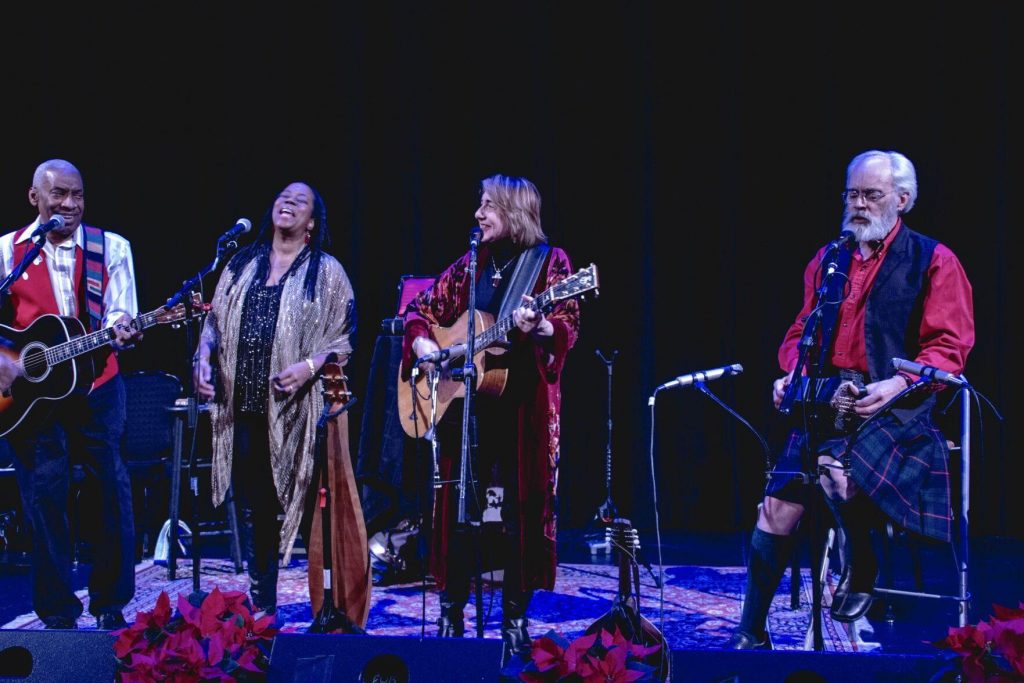I’ve always thought it rather ironic that blues rarely tackles the civil rights movement, whereas it’s a recurring theme in the folk community made up of mostly white people. For half a century Reggie Harris, an African-American folk singer, has run counter to that trend.
“(My partner) Kim and I became a couple in 1975 – you had Odetta and Richie Havens, Josh White and Josh White Jr. – but early on it was basically a shock to the folk music people that those black people were doing folk music. We weren’t doing blues and we weren’t doing R&B.”
This Sunday, December 15th, Kim and Reggie team up with Magpie to present Sing Solstice at the Eighth Step in Schenectady, New York with the goal of bringing light to the winter solstice, the darkest day of the year.
So, how did a black couple from Philadelphia get involved in the folk movement? In 1975 this couple wasn’t hanging out with B. B. King or Muddy Waters. They were rubbing shoulders with Pete Seeger who told them the backstory of “We Shall Overcome.”
“The song started out as ‘I’ll Be Alright’ and was taken by one of the early ministers and transferred to the labor and protest movement and then of course several other permutations. Then they introduced it to the Nonviolent Coordinating Committee. The song took off and became the anthem of the movement.
“We started out doing a lot of James Taylor, a bit of Gordon Lightfoot. And that was what sort of brought me into the folk marketplace, getting connected with Pete Seeger and Tom Paxton and Peter, Paul and Mary. So, it was kind of a back door. A lot of my friends came in through more traditional work and some of that also included blues.
“So, I was a late bloomer in the folk market, the folk family, even though that music along with gospel and spirituals is very much part of my genre. I came up in a church that sang a lot of different kinds of music. Gospel and spirituals were a big part of that, and of course those fit right in with the Underground Railroad.”
Many of Harris’ originals concern historical references like the Underground Railroad and people pivotal to the movement like Harriet Tubman.
The overriding theme of Sing Solstice is joy. “I think joy is the thing that eludes most people in their lives. The idea is that you have something special you really want to give to people in ways you do that are critically important. So, yeah, it’s actually creating an atmosphere in which you can invite people into a relationship even if it’s just a brief one – kind of an exchange, a conversation. And music is a conversation.
“If we keep that in mind, we offer what we offer through our songs and our stories in ways that invite people into the relationship of knowing, and then we get stuff back from the audience. It’s a fascinating process that evolved in time.
“The show has evolved into some of the songs that are not necessarily Christmas or Solstice related, but they turn into the need for light because this is a very dark time of the year. For a lot of people the holidays produce depression or just regret about the way life is going. We try to give some sense of hope and looking forward to the coming of spring and the rebirth the world experiences that encourages growth in all of us.”

Sing Solstice takes place at 7 p.m. Sunday at the GE Theatre at Proctor’s Theatre on State St. in Schenectady, New York. Opening the concert are the Pokingbrook Morris Dancers in full medieval costume, performing Abbots Bromley Horn Dance, which originated in the ancient Cotswold region of England.


